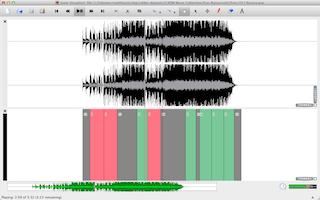Overview
Segmentino is a Vamp plugin for automatic music structural segmentation, based on an algorithm first used in Mauch et al.'s paper on Using Musical Structure to Enhance Automatic Chord Transcription. Version 1.0 was run in MIREX 2013 (results here).

Installation¶
Vamp plugins can be used with any Vamp host. Popular free hosts are Sonic Visualiser, Audacity and Sonic Annotator.
For the newest Segmentino plugin downloads, ready to be installed, go to our Downloads page. Installation instructions for Mac, Windows, Linux can be found here.
Method Overview¶
The idea of the method is quite simple. A beat-quantised chroma representation is used to calculate pair-wise similarities between beats (really: beat "shingles", i.e. multi-beat vectors). Based on this first similarity calculation, an exhaustive comparison of all possible segments of reasonable length in beats is executed, and segments are added to form segment families if they are sufficiently similar to another "family member".
Now comes the crucial greedy step: having accumulated a lot of families, the families are rated, and the one with the highest score is used as the first segmentation group that gets annotated. This last step is repeated until no more families fit the remaining "holes" in the song that haven't already been assigned to a segment. This is described in Mauch et al.'s thesis as heuristic of a music editor who tries to make a concise transcription to make orientation in the score easier, and to save space (or paper).
More details in Mauch's thesis.
Limitations¶
This method was developed for "classic rock" music, and therefore assumes a few characteristics that are not necessarily found in other music: repetition of harmonic sequences in the music that coincide with structural segments in a song; a steady beat; segments of a certain length; corresponding segments have the same length in beats. Furthermore, as with any audio algorithm, the method doesn't work perfectly even if these conditions are actually fulfilled.
Implementation¶
This Vamp implementation was coded by Massimiliano Zanoni, Matthias Mauch and Chris Cannam. It is similar to Mauch's original Matlab implementation used in the publications, but not exactly the same. The beat times are extracted using Davies's beat tracker as implemented in the Queen Mary Vamp plugins, which in turn is based on the QM DSP library. NNLS Chroma is used as a chroma extractor, by borrowing code from the Vamp plugin of the same name.
Examples¶
Some example YouTube videos showing off the range of quality of segmentation one can get using Segmentino.
- excellent: Bring On The Night
- very good: Dirty Work
- less than good: Every Kinda People
- complete failure: New York New York
Citation, License and Use¶
If you make use of this software for any public or commercial purpose, we ask you to kindly mention the authors and Queen Mary, University of London in your user-visible documentation. We're very happy to see
this sort of use but would much appreciate being credited, separately from the requirements of the software license itself (see below).
If you make use of this software for academic purposes, please cite one of the publications indicated on the Publications page.
This program is free software: you can redistribute it and/or modify it under the terms of the GNU Affero General Public License as published by the Free Software Foundation, either version 3 of the License, or (at our option) any later version. This program is distributed in the hope that it will be useful, but WITHOUT ANY WARRANTY; without even the implied warranty of MERCHANTABILITY or FITNESS FOR A PARTICULAR PURPOSE. See the GNU Affero General Public License for more details.
You should have received a copy of the GNU Affero General Public License along with this program. If not, see http://www.gnu.org/licenses/.
Pronunciation¶
Segmentino is pronounced "segmen'TEEno" (not "seg'MENtino", the third person plural conjunctive of the Italian verb "segmentare").
Related publications
- C. Cannam et al., “MIREX 2013 Entry: Vamp Plugins from the Centre for Digital Music.” 2013.
- [More Details] [BIBTEX] [URL (ext.)]
- M. Mauch, K. C. Noland, and S. Dixon, “Using Musical Structure to Enhance Automatic Chord Transcription,” in Proceedings of the 10th International Conference on Music Information Retrieval (ISMIR 2009), 2009, pp. 231–236.
- [More Details] [BIBTEX]
- M. Mauch, “Automatic Chord Transcription from Audio Using Computational Models of Musical Context,” PhD thesis, Queen Mary, University of London, 2010.
- [More Details] [BIBTEX] [URL (ext.)]
Members
Manager: Chris Cannam, Gyorgy Fazekas, Matthias Mauch
Reporter: Simon Dixon